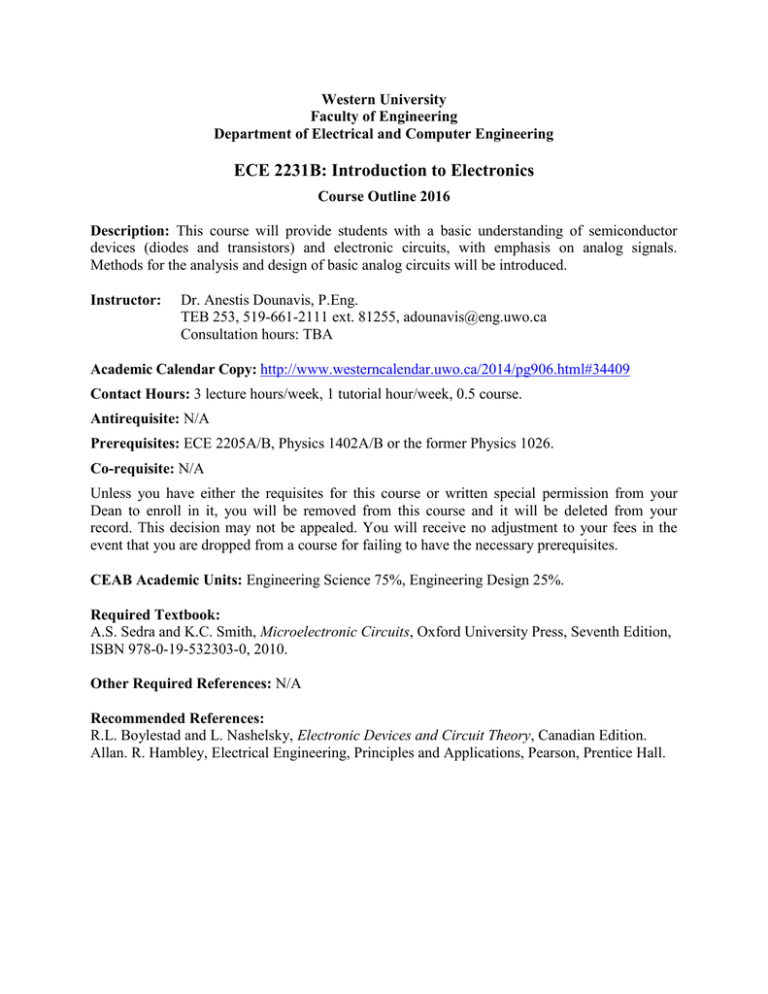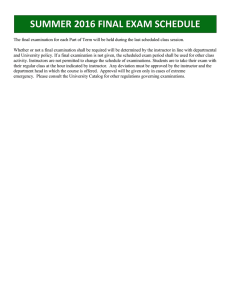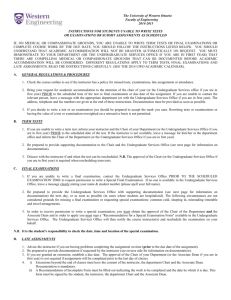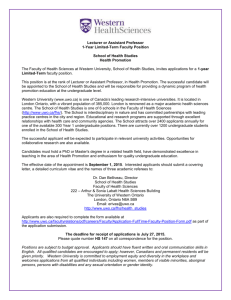
Western University
Faculty of Engineering
Department of Electrical and Computer Engineering
ECE 2231B: Introduction to Electronics
Course Outline 2016
Description: This course will provide students with a basic understanding of semiconductor
devices (diodes and transistors) and electronic circuits, with emphasis on analog signals.
Methods for the analysis and design of basic analog circuits will be introduced.
Instructor:
Dr. Anestis Dounavis, P.Eng.
TEB 253, 519-661-2111 ext. 81255, adounavis@eng.uwo.ca
Consultation hours: TBA
Academic Calendar Copy: http://www.westerncalendar.uwo.ca/2014/pg906.html#34409
Contact Hours: 3 lecture hours/week, 1 tutorial hour/week, 0.5 course.
Antirequisite: N/A
Prerequisites: ECE 2205A/B, Physics 1402A/B or the former Physics 1026.
Co-requisite: N/A
Unless you have either the requisites for this course or written special permission from your
Dean to enroll in it, you will be removed from this course and it will be deleted from your
record. This decision may not be appealed. You will receive no adjustment to your fees in the
event that you are dropped from a course for failing to have the necessary prerequisites.
CEAB Academic Units: Engineering Science 75%, Engineering Design 25%.
Required Textbook:
A.S. Sedra and K.C. Smith, Microelectronic Circuits, Oxford University Press, Seventh Edition,
ISBN 978-0-19-532303-0, 2010.
Other Required References: N/A
Recommended References:
R.L. Boylestad and L. Nashelsky, Electronic Devices and Circuit Theory, Canadian Edition.
Allan. R. Hambley, Electrical Engineering, Principles and Applications, Pearson, Prentice Hall.
General Learning Objectives (CEAB Graduate Attributes)
Use of Engineering
Knowledge Base
3/1
Tools
Individual and Team
Problem Analysis
2/1
Work
Impact on Society and
the Environment
Ethics and Equity
Investigation
Communication Skills
Economics and Project
Management
Design
Professionalism
Life-Long Learning
Notation: x/y, where x is the cognitive level (1: Remember, 2: Understand, 3: Apply) at which the
attribute is assessed and y is the academic level (1: Beginner, 2: Intermediate, 3: Advanced) at which the
attribute is assessed.
Topics and Specific Learning Objectives
1. Semiconductor diodes
- Basic physics of semiconductors of diodes
- The P-N junction and its characteristics.
- Diode models
At the end of this section, students will be able to:
a. Understand the physical structure and design parameters of diodes.
b. Understand how diodes are modeled.
2. Diode circuits and applications
- Rectifiers, voltage regulators,
At the end of this section, students will be able to:
a. Solve diode circuits
3. Bipolar Junction Transistors (BJT)
- Transistors physics and characteristics
- Large-signal and small-signal models.
At the end of this section, students will be able to:
a. Understand the physical structure and design parameters of BJTs.
b. Understand how BJTs are modeled.
4. BJT transistor amplifier topologies, analysis and design.
At the end of this section, students will be able to:
a. Solve BJT circuits such as common emitter, common collector, common base, as well as
two stage amplifier configurations.
5. Field-Effect transistors (FET)
- MOSFET physics and characteristics.
- Large-signal and small-signal models.
At the end of this section, students will be able to:
a. Understand the physical structure and design parameters of FETs.
b. Understand how FETs are modeled.
6. MOSFET amplifier topologies, analysis and design.
a. Solve MOSFET circuits such as common gate, common source, common drain, as well as
two stage amplifier configurations.
Evaluation
Course Component
Homework Assignments
Midterm Test
Final Examination
Weight
10%
30%
60%
To obtain a passing grade in the course, a mark of 50% or more must be achieved on the final
examination as well as on the laboratory. A final examination or laboratory mark < 50% will
result in a final course grade of 48% or less.
Homework Assignments: 5 to 6 assignments will be announced in class and posted online at
http://www.engga.uwo.ca/people/adounavis/courses/ece2231/ece2231.htm
Midterm Test: TBA
Final Examination: The final examination will be take place during the regular examination
period.
Late Submission Policy: Assignments that are late will receive a grade of zero.
Assignment Submission Locker: Locker 203 located on the second floor of TEB.
Use of English: In accordance with Senate and Faculty Policy, students may be penalized up to
10% of the marks on all assignments, tests, and examinations for improper use of English.
Additionally, poorly written work with the exception of the final examination may be returned
without grading. If resubmission of the work is permitted, it may be graded with marks deducted
for poor English and/or late submission.
Attendance: Any student who, in the opinion of the instructor, is absent too frequently from
class, laboratory, or tutorial periods will be reported to the Dean (after due warning has been
given). On the recommendation of the department, and with the permission of the Dean, the
student will be debarred from taking the regular final examination in the course.
Absence Due to Illness or Other Circumstances: Students should immediately consult with the
instructor or department Chair if they have any problems that could affect their performance in
the course. Where appropriate, the problems should be documented (see the attached
“Instructions for Students Unable to Write Tests or Examinations or Submit Assignments as
Scheduled”). The student should seek advice from the instructor or department Chair regarding
how best to deal with the problem. Failure to notify the instructor or department Chair
immediately (or as soon as possible thereafter) will have a negative effect on any appeal.
For more information concerning medical accommodations, see the relevant section of the
Academic Handbook:
http://www.uwo.ca/univsec/pdf/academic_policies/appeals/accommodation_medical.pdf
For more information concerning accommodations for religious holidays, see the relevant section
of the Academic Handbook:
http://www.uwo.ca/univsec/pdf/academic_policies/appeals/accommodation_religious.pdf
Missed Midterm Examinations: If a student misses a midterm examination, the exam will not
be rescheduled. The student must follow the Instructions for Students Unable to Write Tests and
provide documentation to their department within 24 hours of the missed test. The department
will decide whether to allow the reweighting of the test, where reweighting means the marks
normally allotted for the midterm will be added to the final exam. If no reasonable justification
for missing the test can be found, then the student will receive a mark of zero for the test.
If a student is going to miss the midterm examination for religious reasons, they must inform the
instructor in writing within 48 hours of the announcement of the exam date or they will be
required to write the exam.
Cheating and Plagiarism: Students must write their essays and assignments in their own words.
Whenever students take an idea or a passage from another author, they must acknowledge their
debt both by using quotation marks where appropriate and by proper referencing such as
footnotes or citations. University policy states that cheating, including plagiarism, is a scholastic
offence. The commission of a scholastic offence is attended by academic penalties, which might
include expulsion from the program. If you are caught cheating, there will be no second warning.
All required papers may be subject to submission for textual similarity review to commercial
plagiarism-detection software under license to the University for the detection of plagiarism. All
papers submitted will be included as source documents on the reference database for the purpose
of detecting plagiarism of papers subsequently submitted to the system. Use of the service is
subject to the licensing agreement, currently between the University of Western Ontario and
Turnitin.com (http://www.turnitin.com).
Scholastic offences are taken seriously and students are directed to read the appropriate policy,
specifically, the definition of what constitutes a Scholastic Offence, in the relevant section of the
Academic Handbook:
http://www.uwo.ca/univsec/pdf/academic_policies/appeals/scholastic_discipline_undergrad.pdf
Use of Electronic Devices:
Use of Personal Response Devices (“Clickers”):
Policy on Repeating All Components of a Course: Students who are required to repeat an
Engineering course must repeat all components of the course. No special permissions will be
granted enabling a student to retain laboratory, assignment, or test marks from previous years.
Previously completed assignments and laboratories cannot be resubmitted by the student for
grading in subsequent years.
Internet and Electronic Mail: Students are responsible for regularly checking their Western
e-mail and the course web site at
http://www.engga.uwo.ca/people/adounavis/courses/ece2231/ece2231.htm
and making themselves aware of any information that is posted about the course.
Accessibility: Please contact the course instructor if you require material in an alternate format
or if any other arrangements can make this course more accessible to you. You may also wish to
contact Services for Students with Disabilities (SSD) at 519-661-2111 ext. 82147 for any
specific question regarding an accommodation.
Support Services: Office of the Registrar, http://www.registrar.uwo.ca/
Student Development Centre, http://www.sdc.uwo.ca/
Engineering Undergraduate Services, http://www.eng.uwo.ca/undergraduate/
USC Student Support Services, http://westernusc.ca/services/
Students who are in emotional/mental distress should refer to Mental Health @ Western,
http://www.health.uwo.ca/mental_health/, for a complete list of options about how to obtain
help.
Western University - Faculty of Engineering
2015-2016
INSTRUCTIONS FOR STUDENTS UNABLE TO WRITE TESTS OR EXAMINATIONS OR SUBMIT ASSIGNMENTS AS SCHEDULED
IF, ON MEDICAL OR COMPASSIONATE GROUNDS, YOU ARE UNABLE TO WRITE TERM TESTS OR FINAL EXAMINATIONS OR
COMPLETE COURSE WORK BY THE DUE DATE, YOU SHOULD FOLLOW THE INSTRUCTIONS LISTED BELOW. YOU SHOULD
UNDERSTAND THAT ACADEMIC ACCOMMODATION WILL NOT BE GRANTED AUTOMATICALLY ON REQUEST. YOU MUST
DEMONSTRATE TO YOUR DEPARTMENT (OR THE UNDERGRADUATE SERVICES OFFICE) THAT THERE ARE COMPELLING MEDICAL
OR COMPASSIONATE GROUNDS THAT CAN BE DOCUMENTED BEFORE ACADEMIC ACCOMMODATION WILL BE CONSIDERED.
DIFFERENT REGULATIONS APPLY TO TERM TESTS, FINAL EXAMINATIONS AND LATE ASSIGNMENTS. READ THE INSTRUCTIONS
CAREFULLY. (SEE THE 2015 UWO ACADEMIC CALENDAR).
A.
B.
C.
GENERAL REGULATIONS & PROCEDURES
1.
All first year students will report to the Undergraduate Services Office, SEB 2097, for all instances.
2.
If you are an upper year student and you are missing a test/assignment/lab or exam that is worth MORE THAN 10% of your final grade, you
will report to the Undergraduate Services Office, SEB 2097. Otherwise, you will report to your department office to request accommodation.
3.
Check the course outline to see if the instructor has a policy for missed tests, examinations, late assignments or attendance.
4.
Documentation must be provided as soon as possible. If no one is available in your Department office or the Undergraduate Services Office,
leave a message clearly stating your name & student number and reason for your call. The department telephone numbers are given at the end
of these instructions.
5.
If you decide to write a test or an examination you should be prepared to accept the mark you earn. Rewriting tests or examinations or having
the value of a test or examination reweighted on a retroactive basis is not permitted.
TERM TESTS
1.
If you are in first year and you are unable to write a term test, contact the Undergraduate Services Office, SEB 2097 PRIOR to the scheduled
date of the test.
2.
If you are an upper year student and you are unable to write a term test, inform your instructor PRIOR to the scheduled date of the test. If the
instructor is not available, leave a message for him/her at the department office. If the test is worth MORE THAN 10% of your final grade you
will report to the Undergraduate Services Office, SEB 2097 to request accommodation. Otherwise, you will report to your department office to
request accommodation.
3.
Be prepared to provide supporting documentation to the Department Chair and/or the Undergraduate Services Office (see next page for
information on documentation).
4.
Discuss with the instructor if and when the test can be rescheduled. N.B. The approval of the Chair or the Undergraduate Services Office is
required when rescheduling term tests.
FINAL EXAMINATIONS
1. If you are unable to write a final examination, contact the Undergraduate Services Office PRIOR TO THE SCHEDULED EXAMINATION
TIME to request permission to write a Special Final Examination. If no one is available in the Undergraduate Services Office, leave a message
clearly stating your name & student number.
2. Be prepared to provide the Undergraduate Services Office with supporting documentation (see next page for information on documentation)
the next day, or as soon as possible (in cases where students are hospitalized). The following circumstances are not considered grounds for
missing a final examination or requesting special examinations: common cold, sleeping in, misreading timetable and travel arrangements.
3. In order to receive permission to write a special examination, you must obtain the approval of the Chair of the Department and the Associate
Dean and in order to apply you must sign a "Recommendation for a Special Examination Form" available in the Undergraduate Services
Office. The Undergraduate Services Office will then notify the course instructor(s) and reschedule the examination on your behalf.
N.B. It is the student's responsibility to check the date, time and location of the special examination.
D.
LATE ASSIGNMENTS
1. Advise the instructor if you are having problems completing the assignment on time (prior to the due date of the assignment).
2. Be prepared to provide documentation if requested by the instructor (see reverse side for information on documentation).
3. If you are granted an extension, establish a due date. The approval of the Chair of your Department (or the Associate Dean if you are in first
year) is not required if assignments will be completed prior to the last day of classes.
4. i) Extensions beyond the end of classes must have the consent of the instructor, the department Chair and the Associate Dean.
Documentation is mandatory.
ii) A Recommendation of Incomplete Form must be filled out indicating the work to be completed and the date by which it is due. This
form must be signed by the student, the instructor, the department Chair and the Associate Dean.
E.
SHORT ABSENCES
If you miss a class due to a minor illness or other problems, check your course outlines for information regarding attendance requirements and
make sure you are not missing a test or assignment. Cover any readings and arrange to borrow notes from a classmate.
F.
EXTENDED ABSENCES
If you are absent more than one week or if you get too far behind to catch up, you should consider reducing your workload by dropping one or
more courses. (Note drop deadlines listed below). You may want to seek advice from the academic counsellor in your Department or Ms. Karen
Murray in the Undergraduate Services Office, if you are in first year.
G.
DOCUMENTATION
If you consulted an off-campus doctor or Student Health Services regarding your illness or personal problem, you must provide the doctor with a
Student Medical Certificate to complete at the time of your visit and then bring it to the Department (or the Undergraduate Services Office). This
note must contain the following information: severity of illness, effect on academic studies and duration of absence. Regular doctors notes
will not be accepted; only the Student Medical Certificate will be accepted.
In Case of Serious Illness of a Family Member: Provide a Student Medical Certificate to your family member's physician to complete and bring it
to the Department (or the Undergraduate Services Office if you are in first year).
In Case of a Death: Obtain a copy of the death certificate or the notice provided by the funeral director's office. You must include your
relationship to the deceased and bring it to the Department (or the Undergraduate Services Office if you are in first year).
For Other Extenuating Circumstances: If you are not sure what documentation to provide, ask the Departmental Office (or the Undergraduate
Services Office if you are in first year) for direction.
Note: Forged notes and certificates will be dealt with severely. To submit a forged document is a scholastic offence (see below).
H.
ACADEMIC CONCERNS
1. You need to know if your instructors have a policy on late penalties, missed tests, etc. This information may be included on the course
outlines. If not, ask your instructor(s).
2. You should also be aware of attendance requirements in some courses. You can be debarred from writing the final examination if
your attendance is not satisfactory.
3. If you are in academic difficulty, check out the minimum requirements for progression in the calendar. If in doubt, see your academic
counsellor.
Calendar References: Check these regulations in your 2015 Western Academic Calendar available at www.westerncalendar.uwo.ca.
Absences Due to Illness: http://www.westerncalendar.uwo.ca/2015/pg117.html
Academic Accommodations for Students with Disabilities: http://www.westerncalendar.uwo.ca/2015/pg118.html
Academic Accommodations for Religious or Holy Days: http://www.westerncalendar.uwo.ca/2015/pg118.html
Course Withdrawals: http://www.westerncalendar.uwo.ca/2015/pg157.html
Examinations: http://www.westerncalendar.uwo.ca/2015/pg129.html
Scheduling of Term Assignments: http://www.westerncalendar.uwo.ca/2015/pg97.html
Scholastic Offences: http://www.westerncalendar.uwo.ca/2015/pg113.html
Student Medical Certificate: http://www.uwo.ca/univsec/pdf/academic_policies/appeals/medicalform.pdf
Engineering Academic Regulations: http://www.westerncalendar.uwo.ca/2015/pg1442.html
Note: These instructions apply to all students registered in the Faculty of Engineering regardless of whether the courses are offered by the Faculty of
Engineering or other faculties in the University.
Drop Deadlines:
First term half course (i.e. “A” or “F”):
Full courses and full-year half courses (i.e. “E”,“Y” or no suffix):
Second term half or second term full course (i.e. “B” or “G”):
November 5, 2015
November 30, 2015
March 7, 2016
Contact Information:
Undergraduate Services Office:
Dept. of Chemical and Biochemical Engineering & Green Process Engineering:
Dept. of Civil and Environmental Engineering:
Dept. of Electrical and Computer Engineering, Software Engineering &
Mechatronics Engineering:
Dept. of Mechanical and Materials Engineering:
SEB 2097
TEB 477
SEB 3005
Telephone: (519) 661-2130
Telephone: (519) 661-2131
Telephone: (519) 661-2139
Fax: (519) 661-3757
Fax: (519) 661-3498
Fax: (519) 661-3779
TEB 279
SEB 3002
Telephone: (519) 661-3758
Telephone: (519) 661-4422
Fax: (519) 850-2436
Fax: (519) 661-3020
Revised 08/05/15






